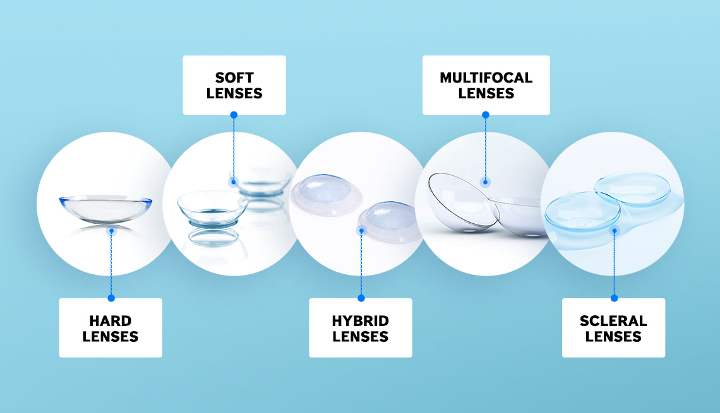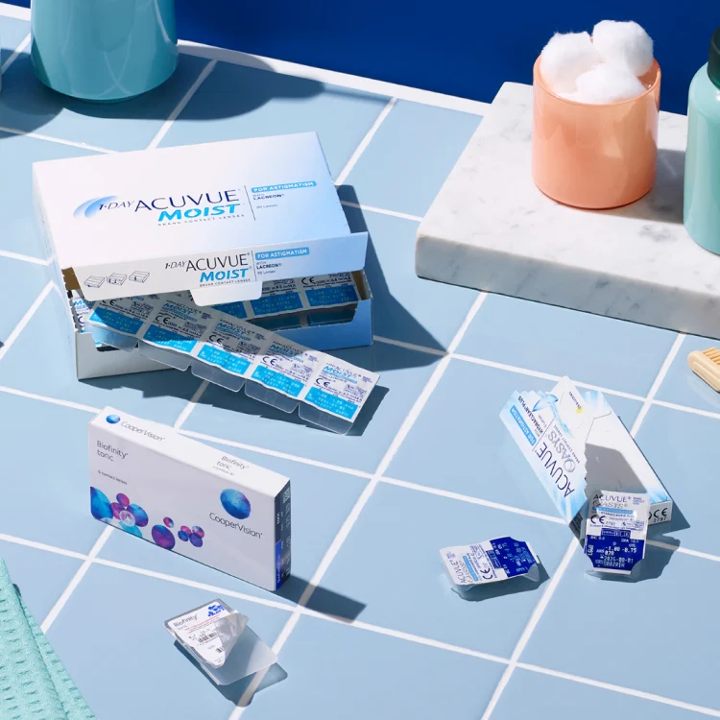Are you considering contact lenses for the first time or looking to switch your current ones? With so many options available, it can be overwhelming to choose the right pair for your vision needs. This guide will walk you through the different types of contact lenses and help you make an informed decision.
Understanding Different Types of Contact Lenses
Contact lenses have evolved significantly over the years, offering a wide range of options to meet various vision needs and lifestyles. Here’s an overview of the main types of contact lenses available:

1. Soft Contact Lenses
Soft lenses are the most popular choice for many users due to their flexibility and comfort. Made from water-containing hydrogels or silicone hydrogels, these lenses allow oxygen to reach the cornea, helping maintain eye health. They are ideal for correcting conditions like nearsightedness (myopia), farsightedness (hyperopia), astigmatism, and presbyopia. Soft lenses can be worn daily, or as extended wear, which allows them to be worn continuously for several days or weeks depending on the brand.
2. Toric Contact Lenses
Designed specifically for astigmatism, toric lenses have different curvatures at different points to correct uneven eye shapes. Available in both soft and RGP versions, these lenses provide clearer vision for individuals whose eyes are not perfectly round.
3. Rigid Gas Permeable (RGP) Lenses
Also known as hard lenses, RGP lenses are made of durable materials that allow oxygen to pass through. While less flexible than soft lenses, they provide sharper vision for some users, especially those with irregular corneas or higher levels of astigmatism. RGP lenses are typically used for complex vision correction needs, such as keratoconus, and may take longer to adapt to but offer a long lifespan.
4. Multifocal/Bifocal Contact Lenses
Multifocal and bifocal lenses are designed to correct presbyopia, an age-related condition that affects near vision. They allow users to see both near and far by incorporating different prescription zones into the lens. Multifocal lenses provide a more gradual transition between distances, while bifocal lenses have distinct zones for near and far vision.
5. Colored Contact Lenses
Available in both prescription and non-prescription versions, colored lenses offer the ability to change or enhance the natural color of your eyes. They can be used for cosmetic purposes or vision correction, but they require the same level of care and maintenance as regular contact lenses.
Daily, Weekly, and Monthly Disposable Contact Lenses
When it comes to the selection of contact lenses, an important consideration is their disposability. This choice plays a significant role in both comfort and eye health. Below, we shall explore the characteristics of daily, weekly, and monthly disposable contact lenses, along with their respective benefits.

1. Daily Disposable Contact Lenses
Daily disposable lenses are intended for single use. They are worn for one day and then discarded, allowing the wearer to enjoy the convenience of fresh lenses each morning.
Benefits of Daily Disposables:
- These lenses require no cleaning or storage, making them ideal for individuals with busy lifestyles.
- Each day starts with a new pair of lenses, which helps minimize the risk of eye infections and irritation.
- Many daily disposables are made from advanced materials that retain moisture, ensuring comfort throughout the day.
Such lenses are particularly suited for those with sensitive eyes or those who prefer a simple, maintenance-free option.
2. Weekly Disposable Contact Lenses
Weekly disposable lenses are designed for wear over a period of up to one week. After each day’s use, they must be cleaned and stored appropriately to maintain their condition.
Benefits of Weekly Disposables:
- These lenses offer extended wear time compared to daily disposables, catering to those who may need lenses for longer periods.
- They tend to be more economical than daily disposables, providing good value for those who wear lenses regularly.
These lenses are a suitable choice for individuals who seek a balance of convenience and cost-efficiency while being committed to proper lens care.
3. Monthly Disposable Contact Lenses
Monthly disposable lenses may be worn for up to thirty days. As with weekly lenses, users must ensure they are cleaned and stored properly each night to uphold hygiene and performance.
Benefits of Monthly Disposables:
- They generally offer a lower cost per day compared to both daily and weekly options, making them budget-friendly.
- Monthly lenses come in various designs, accommodating diverse vision correction needs, including those for astigmatism and presbyopia.
These lenses are well-suited for individuals who appreciate longer wear times and are diligent in maintaining their lens hygiene.
Right Contact Lenses for Eye Conditions
Choosing the appropriate contact lenses is crucial for managing various eye conditions effectively.

For nearsightedness (myopia), standard spherical lenses are designed to correct near vision by bending light to focus on the retina. Options include daily disposables or monthly lenses, depending on your lifestyle preferences.
For farsightedness (hyperopia), convex lenses help focus light on the retina, improving distance vision. Like myopia, both daily and monthly disposables can be suitable.
Individuals with astigmatism require toric lenses, which are specifically designed to address the irregular shape of the cornea. These lenses are available in both soft and rigid gas-permeable varieties, with options for daily or extended wear.
Presbyopia, a condition affecting those over 40, can be managed with bifocal or multifocal lenses. These lenses feature multiple prescriptions within one lens, enabling clear vision at various distances.
More factors to consider when choosing contact lenses
1. Prescription Details
Having an accurate and up-to-date prescription is essential. This includes not only the lens power (spherical power for nearsightedness or farsightedness) but also measurements like base curve and diameter, which affect how the lens fits your eye. If your prescription has changed, make sure to consult your eye care professional to ensure you select the right lenses.
2. Lens Material
Contact lenses come in different materials, primarily hydrogel and silicone hydrogel. Hydrogel lenses are soft and comfortable but may have lower oxygen permeability, which can lead to dryness. Silicone hydrogel lenses allow more oxygen to reach the cornea, enhancing comfort and reducing the risk of complications, especially for those who wear lenses for extended periods.
3. Lifestyle and Activities
Your daily activities should significantly influence your choice of contact lenses.
- Active Lifestyle: If you engage in sports or outdoor activities, look for lenses designed for stability and durability. Some brands offer lenses that resist moisture and provide better vision during physical exertion.
- Computer Use: For those who spend long hours in front of screens, consider lenses with moisture-retaining properties or those specifically designed to reduce digital eye strain. These lenses can help alleviate dryness and discomfort.
4. Eye Health
Your overall eye health is crucial in choosing the right lenses.
- Dry Eyes: If you have dry eyes, opt for lenses that retain moisture or have a high water content. Discuss with your eye care professional about options tailored for dry eye management.
- Allergies and Sensitivities: Some materials may cause irritation for those with allergies or sensitivities. Hypoallergenic lenses can be a suitable choice in such cases.
- Previous Surgeries: If you have had eye surgeries, such as LASIK, consult your eye care professional for recommendations on the best lens options for your condition.
5. Comfort and Fit
The fit of the lenses is crucial for comfort and effectiveness.
- Fitting Consultation: A professional fitting can help determine the best type and size of lens for your eyes. Ill-fitting lenses can cause discomfort, irritation, or even serious eye issues.
- Trial Period: Many eye care professionals offer trial lenses, allowing you to wear them before making a final decision. Pay attention to how they feel throughout the day.
6. UV Protection
Some contact lenses provide UV protection, which can help shield your eyes from harmful ultraviolet rays. However, it’s essential to remember that UV protection in lenses does not replace sunglasses. If you spend a lot of time outdoors, consider lenses with UV-blocking features, but also wear sunglasses for additional protection.
7. Color and Cosmetic Options
Colored contact lenses can enhance or change your eye color while providing vision correction.
- Safety First: Ensure that any cosmetic lenses you choose are safe and approved by regulatory authorities. It’s essential to purchase them from reputable sources and consult your eye care professional for proper fitting.
- Natural Look: Some lenses offer subtle enhancements, while others provide dramatic changes. Consider what effect you want to achieve and choose accordingly.
8. Cost and Budget
Understanding the costs associated with contact lenses is vital for making an informed choice.
- Initial vs. Ongoing Costs: Factor in not only the price of the lenses but also the cost of cleaning solutions, cases, and potential follow-up appointments. Daily disposables may be convenient but can add up over time compared to monthly options.
- Insurance Coverage: Check if your health insurance covers contact lenses. Some plans may cover a portion of the costs, making them more affordable.
9. Brand Reputation
Choosing lenses from reputable brands ensures you’re using high-quality products.
- Research: Look for brands known for their safety and comfort. Read user reviews and seek recommendations from your eye care professional or friends who wear contacts.
- Innovative Features: Some brands offer lenses with advanced features, such as moisture-lock technology or enhanced UV protection. These can provide additional benefits, improving your overall experience.
By considering these factors, you can select the right contact lenses that fit your lifestyle, vision needs, and comfort preferences, ultimately leading to a better overall experience with contact lens wear.
First-Time Contact Lens Wearers: Meet with an Eye Doctor First
If you're considering wearing contact lenses for the first time, it's essential to schedule an appointment with an eye doctor. A professional eye examinationf for contact lenses fitting ensures that your eyes are healthy and that you receive the right prescription tailored to your vision needs. The eye doctor will assess the curvature and diameter of your eyes, which is crucial for selecting the right lens type and fit.
During this visit, you’ll also receive guidance on the different types of lenses available, including daily disposables, monthly lenses, and specialty options like toric or multifocal lenses. Additionally, the eye doctor can provide important information on proper lens care, hygiene practices, and tips for comfort, making your transition to contact lenses smoother and more enjoyable.
Taking this first step with an eye care professional will help you find the best solutions for your vision, ensuring a positive experience with contact lenses.
Popular Contact Lens Brands
When choosing contact lenses, it's essential to consider reputable brands known for their quality and comfort. Here are some of the most popular contact lens brands that we offer:
- Acuvue: Renowned for its extensive range of lenses, Acuvue provides options for various needs, including daily disposables and toric lenses for astigmatism. Their popular products, such as Acuvue Oasys and Acuvue Moist, are designed for optimal comfort and vision clarity.
- Bausch + Lomb: This brand is well-regarded for its variety of lenses, including soft, rigid gas-permeable (RGP), and specialty options. Bausch + Lomb's Biofinity and SofLens lines are especially favored for their comfort and performance.
- CooperVision: Known for its diverse selection, CooperVision offers a range of lenses, from daily disposables to monthly and specialty lenses. Popular products like Biofinity and Avaira cater to different vision correction needs while prioritizing wearer comfort.
- SEED: A prominent choice in the contact lens market, SEED is celebrated for its high-quality soft lenses. With a focus on comfort and affordability, SEED offers both daily disposable and monthly lenses that retain moisture and provide excellent breathability.
Shop Now Request An Appointment